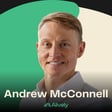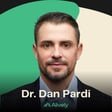
Why The Fertility Rate Is Falling with Vida Delrahim and Ronit Menashe - E64
Fertility rates are dropping worldwide, and more people are struggling to conceive than ever before - sometimes without any real answers from doctors as to why.
Trying to start or grow a family can feel overwhelming, isolating, and loaded with blame or confusion, especially as modern life adds stress, toxins, and poor nutrition into the mix. Partners are left wondering if they're too late, not doing enough, or simply at the mercy of their biology.
But what if the narrative around fertility could be reframed?
This episode cuts through the fear and frustration to reveal a simple yet practical approach to reproductive health: one that treats fertility as a team effort, not a solitary struggle. Hear firsthand from women who turned heartbreak into action and discovered how to prepare mind, body, and relationship for healthy conception, all while battling the modern challenges that can stand in the way.
Vida Delrahim and Ronit Menashe are the co-founders of WeNatal, a company reshaping prenatal and fertility care by emphasizing team-based preparation for both parents. Vida, with a background leading global events at Nike, and Ronit, an entrepreneur deeply involved in the functional medicine space, combined their personal experiences with miscarriage to develop a science-driven approach to fertility. Together, they’ve built WeNatal into a resource-rich community, providing education and premium supplements that have supported over 30,000 families in navigating fertility with a focus on shared responsibility and health optimization.
“We never imagined we'd be what would be born out of [the] heartbreak that we both suffered with our pregnancies.” - Vida Delrahim
In this episode you will learn:
- Why fertility should be treated as a team sport, and the impact of a three-month “trimester zero” preparation for both partners before trying to conceive.
- The connection between sexual health and overall health, including how optimizing sperm and egg quality can serve as a barometer for broader well-being.
- How environmental toxins, diet, lifestyle factors, and everyday stressors are contributing to a modern fertility crisis - and practical ways to address them.
- The critical differences between men’s and women’s prenatal supplements, with a focus on key nutrients for each and why antioxidant support is essential.
- The ongoing value of prenatal and postnatal supplementation for both partners, even beyond conception, to support mental clarity, recovery, and long-term health.
- Actionable, low-barrier steps for improving fertility and general wellness, such as incremental changes in household products, gratitude practices, and building healthy routines one step at a time.
Resources
- Connect with Via and Ronit on WeNatal’s Instagram: https://www.instagram.com/we_natal/
- Sign up for the WeNatal fertility masterclass: https://wenatal.com/pages/masterclass
- Shop WeNatal’s range: https://wenatal.com/collections/shop
This podcast was produced by the team at Zapods Podcast Agency:
Find the products, practices, and routines discussed on the Alively website:
















